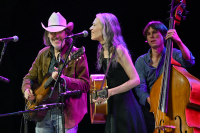In the unlikely event that Bruce Hornsby and Morten Harket, A-ha’s singer, ended up featuring in the Daily Mail for, I don’t know, getting into a fight in a supermarket over the last luxury Scotch egg, they would be described as ‘“The Way It Is” hitmaker’ and ‘the “Take on Me” star’.
In neither case, I suspect, would that be how they would choose to be remembered. In Hornsby’s case, I know it’s not, because he told me so earlier this year. And when he played that song — a piece of high-class MOR so persuasive that it’s been sampled by hip-hop stars and used incessantly in TV montages since 1986 — at his London show, he introduced it by saying it was ‘why some of you are here. But if you don’t like the rest of it, don’t come back.’ He said it good-naturedly, but I think he meant it.
For Harket, the curse was to be cast as a teen heartthrob, when he saw himself as a Kierkegaard-reading, philosophy-expounding artist. Even though the sound of middle-aged screams was pretty intense at the Albert Hall — ‘I’ve loved you for 33 years, you gorgeous man,’ yelled a woman a couple of rows behind me — Harket was a defiantly low-key presence, leaving most of the chat to keyboard player Magne Furuholmen, not bothering with anything so irksome as stagecraft, and keeping his specs on. Sadly for him, he still looks like a million dollars: if his cheekbones are no longer sharp enough to cut glass, they could certainly slice through a piece of Cheddar.
Hornsby and A-ha followed different paths. A-ha stuck to a career of pop, albeit extremely well-turned pop, with a level of sophistication that means a song like ‘The Sun Always Shines on TV’ still sounds modern now. But Hornsby, as the 1990s began, turned his back on the mainstream. First he joined the Grateful Dead for a spell, then set about a new career playing whatever took his fancy, often involving jazz improvisation, modern classical, and Americana, along with the melodic sense that never deserted him (this year’s album, Absolute Zero, was a treat. I can’t recommend it enough).
Different paths meant different shows. A-ha’s featured them playing their debut album in full, then following it with a selection of other hits, and it was pretty terrific. Harket’s voice is a thing of wonder, hitting high notes with a purity that suggests he didn’t spend his twenties and thirties snorting and smoking. And after a run of Albert Hall shows by older artists that have been received respectfully, it was nice to see and hear a group whose ages range from 57 to 60 generate a sense of abandon.
There was no hysteria at Hornsby’s show, just a man with the air of a distracted history teacher and a concert grand on a bare stage (it was in the wrong place, too; the Empire is fine for a rock show, but this should have been at the Queen Elizabeth Hall or Cadogan Hall). And it was less fun. But it was fascinating, and compelling. Hornsby’s humour isn’t dry so much as arid, teasing the people who had come to hear his late-1980s hits. ‘I’m very interested in modern classical music. Stuff that almost everyone hates. Stuff like this,’ he said, launching into what I rather think was something by Ligeti, which gave way to his old single ‘Every Little Kiss’. There were cheers, probably as much from relief as anything.
He seemed to take each song as an opportunity to see how far away from the core of it he could go and still find his way back. In ‘The Valley Road’, cast as a 12-bar blues, his solo seemed to veer off at a complete tangent, until one realised that it was a conventional piece of playing, except with large chunks removed, and on unexpected beats. It was audacious and hilarious, albeit not in a way that encouraged laughter.





Comments